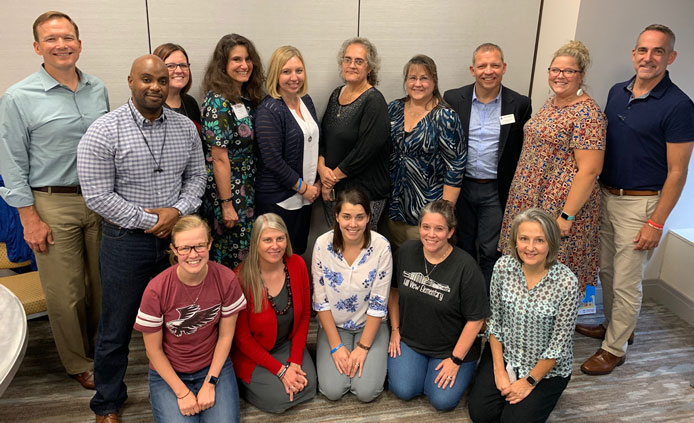ESP Educator Voice Academy
Overview
In 2019, the NEA created the Educator Voice Academies (EVAs) to help build an understanding of opportunities within ESSA and the power of lifting and amplifying educator voices for state and local affiliate members. This effort was led by NEA Education Policy and Practice in partnership with NEA’s Center for Organizing, Center for Social Justice, Center for Advocacy, Center for Great Public Schools, and Center for Governance. The first cycle featured in-person learning opportunities that brought state and local teams together to brainstorm, collaborate, and create plans of action to help continue this work in their school communities. Ohio’s 2019 team chose to organize around improving our state’s school accountability system, and that work helped lead to the successful passage of HB 82, which eliminated the A-F school report card and instituted an OEA-sponsored “student opportunity profile” which will be implemented after the 2022-23 school year.
After the success of the initial Educator Voice Academies, the NEA collectively and collaboratively sought to continue moving this work forward to leverage the voices of our members as partners in delivering equitable opportunities for all students across race, ZIP code, background, and ability. These efforts moved us into the next phase of our work: highlighting educator-created plans to improve public education focused on specific priority issues.
In 2022, OEA formed state Educator Voice Academy teams to address issues related to Teacher Recruitment & Retention and Social & Emotional Learning. From that process, OEA has laid out a comprehensive set of recommendations for addressing the growing educator shortage crisis. (Click here for details.) One of the signature recommendations of the team working on the teacher shortage was establishing a new team to focus specifically on the need to recruit and retain education support professionals (ESPs) in Ohio’s public schools. Acute shortages of bus drivers, paraprofessionals, cafeteria workers, school secretaries, and other essential workers have significantly disrupted student learning, strained school working conditions, and highlighted the need to invest in our ESPs. The OEA Educator Voice Academy cadre for Education Support Professionals will develop advocacy and organizing strategies to ensure every student in Ohio is served by caring, qualified support professionals who are respected, given the resources they need to be successful, and reflect the diversity of our population.
Process
OEA is currently building a team of ESP members from a diverse mix of races, genders, job classifications, experience levels, and education settings from across Ohio. Applications may be submitted using the form linked on this page. This Educator Voice Academy team will be facilitated by an OEA officer with support OEA staff and will draw on resources from NEA. The schedule and format of meetings will be determined by the team, but it will involve a combination of virtual and in-person meetings held between January and the summer of 2023. Members will not be required to meet during normal working hours.

October-November 2021 Ohio Schools
- COVER STORY: Empowering Students
- 2022 Ohio Teacher of the Year Kurt Russell, a social studies teacher at Oberlin High School, wants his students to be authentic, confident, and know their potential.
- NOTEBOOK
- 2021 NEA Representative Assembly Looks Ahead to New Challenges and Opportunities
- MAKING THE GRADE
- OEA Member Receives National Award for Teaching Excellence
Moved recently? Contact the OEA Member Hotline to update the address on file at 1-844-OEA-Info (1-844-632-4636) or email, membership@ohea.org. Representatives are available Monday-Friday, from 8:30 a.m. to 6 p.m. | OhioSchools — Past Issues

 Oh Yes, We’re Social — Join the Conversation!
Oh Yes, We’re Social — Join the Conversation!
2021-2022 OEA Member Resource Guide
Use this guide as an overview to help you make the most of your OEA Membership. Within, you’ll learn more about:
- Ways to Become Involved
- Fighting for Public Education
- OEA Staff, Leadership, and Board of Directors
- OEA Higher Education Benefit
- Awards and Scholarships
- Valuable NEA Member Benefits and Services
Throughout our more than 150-year history, OEA members have been involved in every struggle and effort to advance the finest of America’s dreams: a quality public education for every child.
If you have additional questions, contact us at 1-844-OEA-Info (1-844-632-4636) or send us an email to: membership@ohea.org.
Moved recently? Contact the OEA Member Hotline to update the address on file at 1-844-OEA-Info (1-844-632-4636) or email, membership@ohea.org. Representatives are available Monday-Friday, from 8:30 a.m. to 6 p.m. | OhioSchools — Past Issues
![]()
![]() Oh Yes, We’re Social — Join the Conversation!
Oh Yes, We’re Social — Join the Conversation!
![]()
Ohio Code of Conduct FAQs
Below are documents for a variety of topics to Frequently Asked Questions relating to Ohio’s Code of Conduct developed jointly between OEA and the Ohio Department of Education.
Click on each topic to down each document in .pdf format in the links below
- Social Media Tips – FAQ 1
Smart technology is a convenient tool however it is important to keep the use of professional and personal accounts separate. - Extracurricular Leaders – FAQ 2
Educators who work with students outside of the classroom in academic, art and sports face unique risks. - Dollars and Sense – FAQ 3
Educators who collect, raise and/or manage money can be held personally and professionally liable. - Drugs and Alcohol – FAQ 4
Any inappropriate use of alcohol, tobacco or drugs can put an educator’s licensure at risk. - Top Ten Professional Conduct Concerns – FAQ 5
Information to help caring educators avoid mistakes which can lead to consequences. - Testing and Academic Integrity – FAQ 6
Accurate collection and reporting of all educational data (testing, attendance, grades, etc.) is required of all licensed educators. - Rapback Applications – FAQ 7
To ensure safe learning communities, all individuals seeking initial and/or renewal of licenses and permits, must complete required background checks. - Classroom Management and Etiquette – FAQ 8
The proactive implementation of positive classroom management and expectations can go a long way in preventing licensure consequences. - Broken Contracts – FAQ 9
All licensed individuals should understand the legal and licensure consequences of breaking a contract. - Educational Leaders – FAQ 10
Educational leaders who demonstrate professionalism sets the tone of educational communities and workplaces. - Remote Instruction – FAQ 11
With the changes to instructional format, situations relating to ethics, student privacy and professional conduct may look different. - Professional Boundaries and Personal Business – FAQ 12
Technology can blur the line between professional and personal interaction with students. - Mandatory Reporting – FAQ 13
All educational employees are considered mandatory reporters of abuse and neglect.


